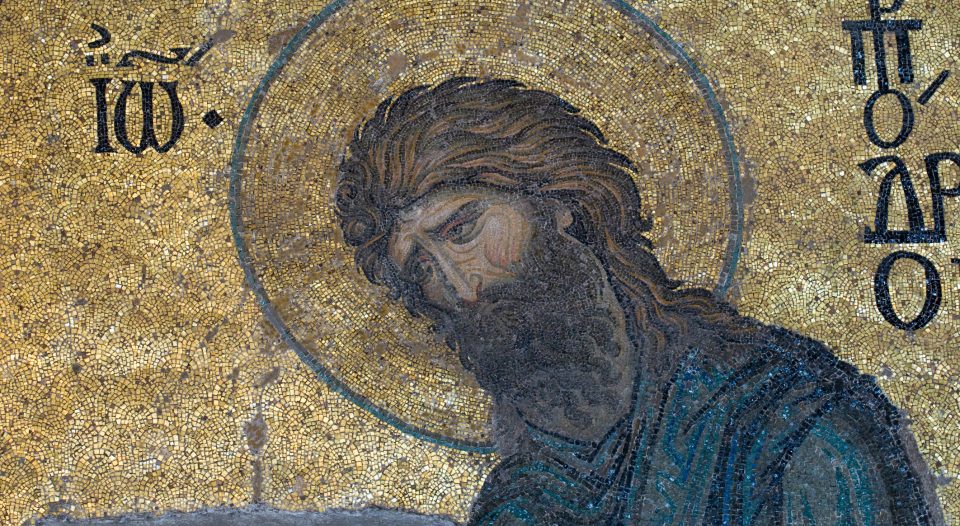Lectionary for Dec. 4, 2022
Second Sunday of Advent
Isaiah 11:1-10; Psalm 72:1-7, 18-19;
Romans 15:4-13; Matthew 3:1-12
Oh, to be a member of John’s assembly in the wilderness! The reading from Matthew tells us that people from Jerusalem, all Judea and the region around Jordan are going to John the Baptizer’s camp on the Jordan River to be baptized for repentance. We must remember, to repent is not just to confess sins and feel sorry but to reorient a human life in a godlier direction. In a time of great uncertainty, national peril and armies on the move, a large percentage of the population knew there was a problem and wanted to reorient their lives. Going out to John was the first step in their journey. As we continue our Advent journey of reflection and preparation, let’s take a closer look at John and those who went out to him.
In the first Gospel in the canon, John the Baptizer has no introduction. We don’t know, as Luke will tell us, that Jesus and John are family. We don’t hear John’s full testimony, as in the Gospel of John (a different John …). No, instead of all this extra information, the reader/listener is understood to know who John the Baptizer is, so he needs no introduction.
Still, the Gospel writer wants to present a few details. John wears a light, comfortable garment of camel hair, as perfectly suited to the drastic temperature changes of the wilderness environment as the camels from which the hair comes (camel hair, when processed, is finer than merino wool). John wears a sturdy belt. This sartorial description is meant to remind the hearer of Elijah the Tishbite, who is introduced wearing the same garments (2 Kings 1:8). And John ate locusts and wild honey (that is, uncultivated dates). Locusts and wild dates don’t come from any farm or plantation but are found only outside of settled places. Again, this should remind the reader of Elijah, who was provided food by God without having to rely on the normal economy or agriculture (1 Kings 17:4-6, 9-16; 19:5-8).
Matthew is telling the discerning audience that, like Elijah before him, John the Baptizer stands outside normal society in the wilderness, insulated from the corrupting allure of money or power. And from the wilderness John calls the people, especially the rulers, to repent of their spiritual and moral perfidy and lack of trust in God’s saving power. John is an outsider in every way. And John’s call was for people to produce a new kind of fruit, not grown of intrigue, religious factionalism or a quest for power, but good fruit, consistent with the repentance that the people had come out to find (Matthew 3:8, 10).
We can be baptized (or remember our baptisms) and be freed from slavery to sin, death, and all that corrodes and corrupts to produce fruit of righteousness.
Hundreds, and maybe thousands of people came out to John, braving the bandit-lined road into the wilderness. Even as he harangued many of those who came out to hear him, still more came. Even the Sadducees and Pharisees, who disagreed on most things, agreed that making the multiple-day journey to the Jordan wilderness to repent and receive John’s baptism was worth their time. When John saw these members of various religious traditions, he was surprised that even they came to seek repentance. He asked them who warned them to flee from the coming wrath (7).
Still, John didn’t turn them away. Instead, he insisted that they, like everyone else, truly repent and produce fruit in keeping with repentance. He warned that every tree that doesn’t produce good fruit will be cut down at the root (not merely the trunk) and thrown into the fire (10). Finally, he warned that, although he baptized for repentance with water, the one coming after him would baptize with the Spirit and fire. The coming one would separate the wheat from the chaff, John warned, continuing the agricultural metaphors that people should grow good, nourishing fruit from their righteous actions.
As we dive fully into Advent and continue to look through Jesus’ mirror at ourselves, our community and our society, how might we imitate the faithfulness of Jerusalem, all Judea and the lands around the Jordan? The first step to repenting is acknowledging that there is a problem, and the second step is committing to do something about it. What in our lives, our churches and our communities isn’t the way it should be? What can we do?
Like John in his day, faithful voices cry out in the wilderness so we don’t have to figure it out for ourselves. Instead, we can be baptized (or remember our baptisms) and be freed from slavery to sin, death, and all that corrodes and corrupts to produce fruit of righteousness. As we prepare to welcome Jesus into the world and into our lives yet again, let us, in his power and name, reject evil and prepare good fruits.




